
Do you often find your cat itching, sneezing, scratching, or coughing? Well, all these symptoms suggest that your cat may have allergies.
Like humans, cats can also have allergies that may be seasonal allergies or environmental allergies. Some cats may even develop allergies to certain cat food, so it is essential to keep an eye out.
Today, we'll talk about what types of allergies cats get, what they may seem like, and, most importantly, how to treat them. From vet treatments to home remedies, we're going to talk about it all.
So, stay with us while we walk you through the world of cat allergies and treatments.
Cat Allergy Symptoms

The most common type of allergies in cats are caused by environmental factors, like dust and pollen that float in the air. When these allergies affect a cat's skin, it's called atopic dermatitis. However, environmental allergies can show up in different ways in cats.
Cats with these allergies often scratch a lot, have red and inflamed skin, and show other symptoms such as:
- Scratching and licking more than usual.
- Developing sores.
- Diarrhea and vomiting.
- Losing hair, having flaky skin, or getting crusty patches.
- Getting sick more often.
- Having respiratory problems.
- Getting ear infections.
- Having nasal and eye discharge.
What Types Of Allergies Are There?
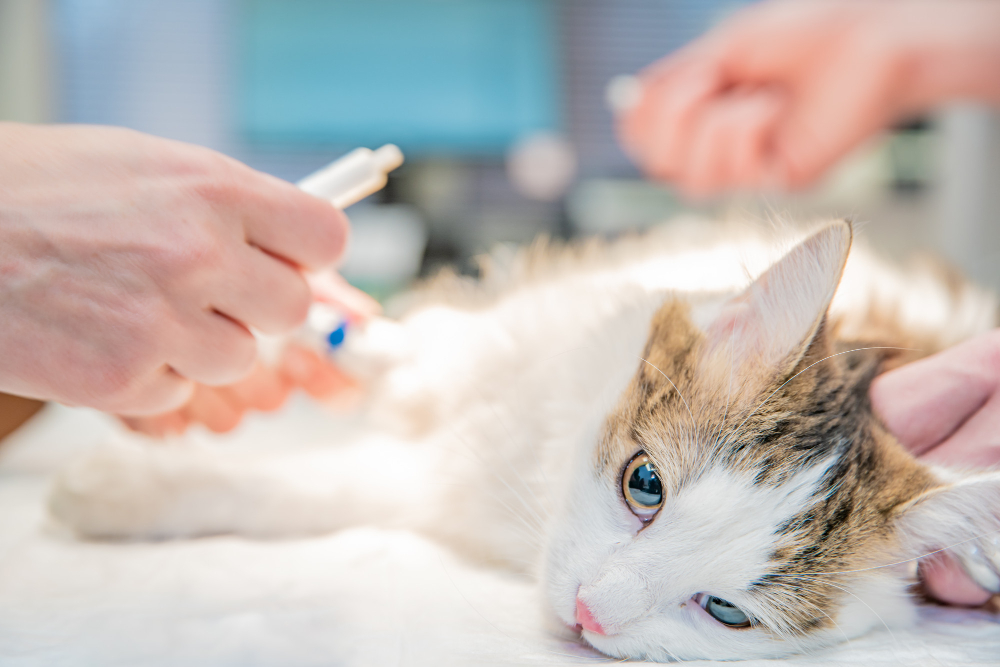
There are primarily three types of allergies that can affect cats. They are:
-
Environmental allergies
Cats can get allergies to different substances in the air, like dust, mold, pet hair, and pollen. To have an allergic reaction, a cat must either breathe these in, leading to respiratory issues, or touch them, which can cause skin problems.
These allergies can happen at different times of the year. Some cats might only have problems during certain seasons, while others can have them all year round. For instance, if a cat is allergic to pollen, they might not have any issues in the winter. Still, if a cat has a dust allergy, it might get triggered at any time during the year.
-
Food allergies
Food allergies are not as common in cats as in dogs, but they can happen to any cat. The main culprits are ingredients like animal proteins, dairy, and wheat found in pet food. Cats can actually be allergic to any food they eat.
So, even though it's less likely in cats, it's still possible for them to have food allergies, and it's essential to watch out for them as responsible pet parents.
-
Flea allergies
Cats can be allergic to fleas' saliva, resulting in a skin reaction that looks like atopic dermatitis. When cats have fleas, they scratch a lot or groom themselves too much, all to ease the discomfort caused by these tiny pests.
This over-scratching and grooming may put your cat at ease temporarily. Still, it can create sores on the skin and potentially lead to infections.
How To Identify Different Cat Allergies?
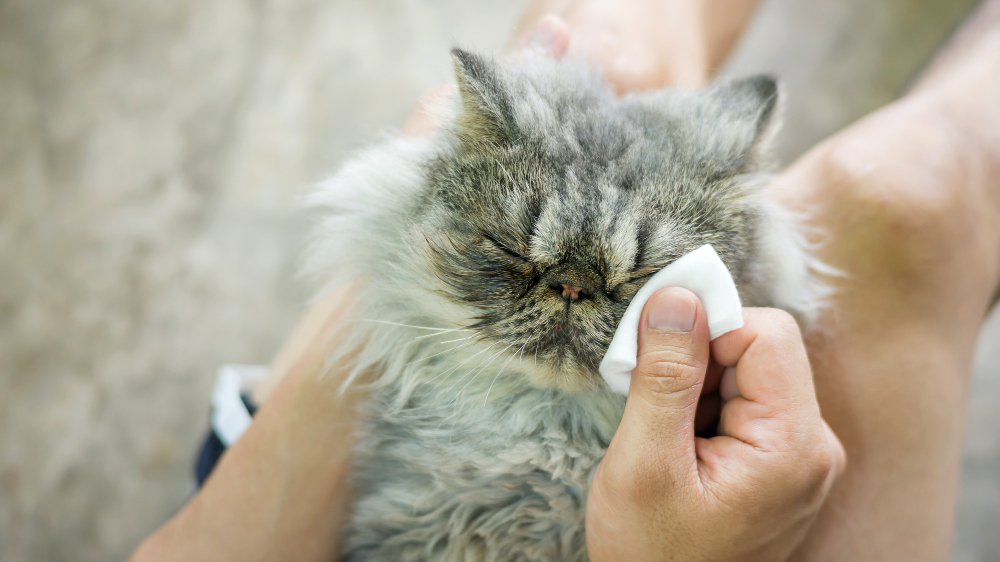
There are different ways you can diagnose various cat allergies. Let's look at them:
-
Environmental allergies
Your vet can opt for skin or blood tests to find out what's causing environmental allergies in your cat. They might do a serology allergy test, which checks for allergens in the blood.
They can also go for a more hands-on approach and do intradermal testing by injecting common allergens into the skin to see if it becomes inflamed or shows other signs of an allergic reaction.
-
Food allergies
If your vet has a hunch your cat has food allergies, they will most likely do an elimination diet. This means they'll take away one ingredient from your cat's food for a bit and see if the problems go away.
They might also give your cat special foods with new and different proteins, like turkey, kangaroo, or duck, to see if your cat is allergic to certain meat.
-
Flea allergies
In the case of flea allergies in your cat, the vet will most likely check for fleas using a special comb.
They might also use a blood test to confirm if it's a flea allergy. In most cases, the vet can figure out if it's fleas just by examining your cat and discussing their medical history.
Seasonal Allergies in Cats
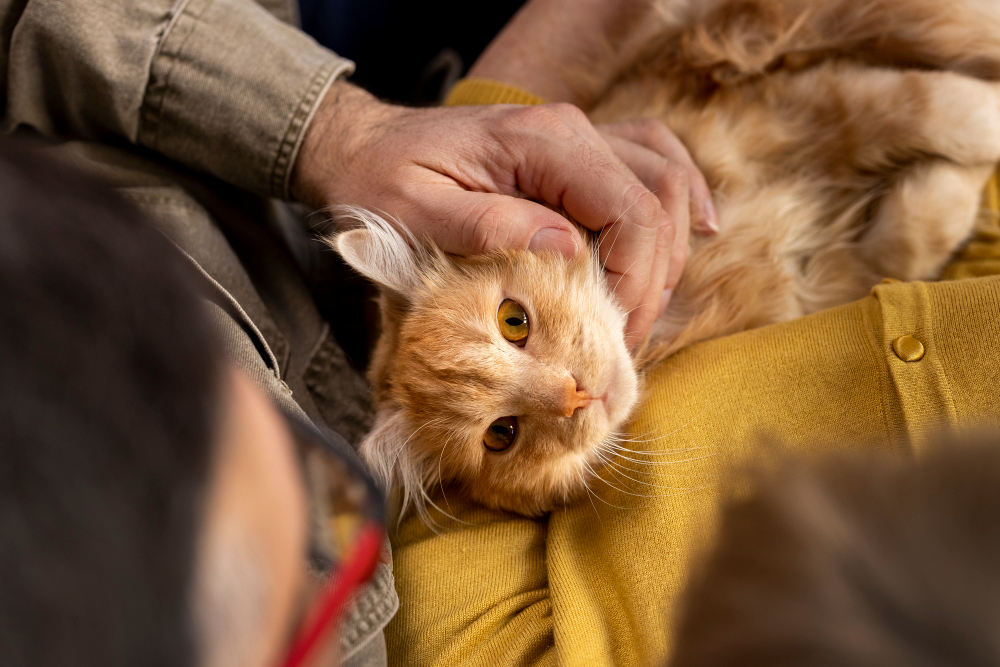
Seasonal allergies in cats are sometimes called "atopic dermatitis" or "atopy." These allergies are seasonal because they appear in certain seasons, mostly spring and summer. They can be predicted by tracking pollen levels, which happen year after year and tend to worsen over time.
They often happen because of a genetic issue with the cat's skin, which lets more allergens in. This can lead to problems like itching, scratching, and infections in the skin and ears. Dealing with cat allergies can be very frustrating for the cat and its owner because there isn't a quick fix.
Allergy Treatments For Cats
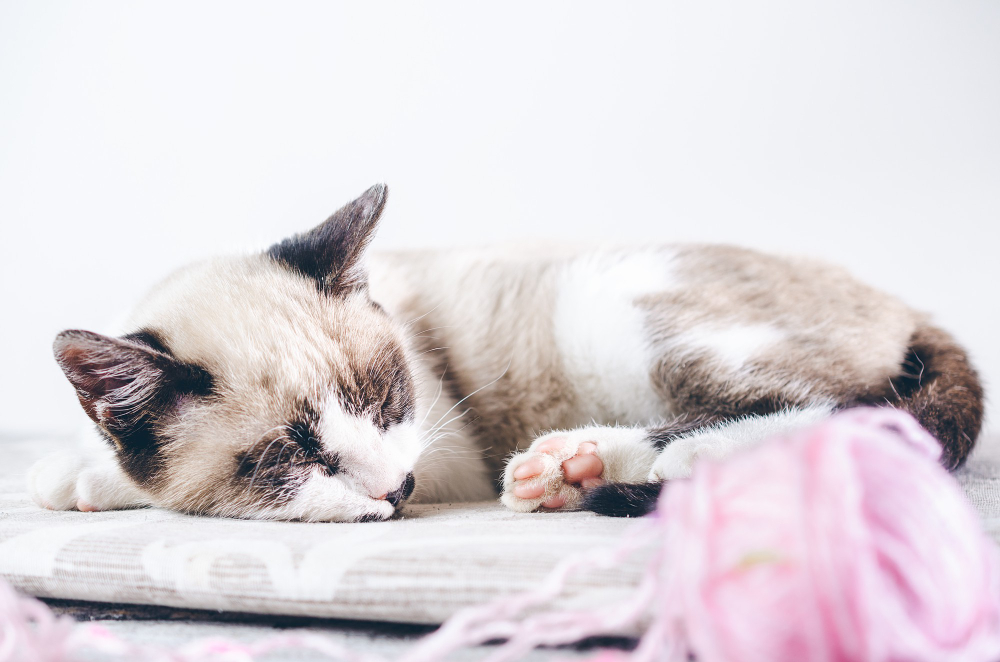
The right way to treat cat allergies can vary depending on what's going on with your cat. Most treatments aim to help with allergy symptoms like itchy skin, sneezing, and inflammation.
Some common allergy medicines for cats are:
-
Corticosteroid pills
Corticosteroids are medicines that help stop itching in cats with allergies. They are a type of steroid that can reduce swelling and are used for mild allergies, especially when a cat has itchy skin.
They work by calming down the body's response to allergens, making your cat more comfortable, and stopping them from scratching their skin so much.
These pills should only be introduced to your cat after clear instructions from the vet. Giving too much of it can be really bad for your cat. Also, you can't just stop this medicine suddenly; you must talk to your vet about it because stopping it all at once can cause big problems.
Even using the pills correctly can make your cat extremely thirsty, leading to more peeing. It can also increase your cat's appetite, make them pant, and sometimes even make them throw up or have diarrhea.
Suppose your cat has to take these pills for a long time. In that case, there can be other issues, like your cat gaining weight and having less energy, and they might even face behavioral changes. So, always talk to your vet to ensure your cat stays healthy while using these pills for allergies.
-
Topicals
Topical means any treatment you can apply directly to your body. Creams, ointments, and drops that you put on your cat's skin, or in its eyes
,and ears can help with allergy symptoms like itchy skin and discomfort.If your cat often gets allergies, it scratches its ears, leading to pain and itchiness. In these situations, your vet might suggest using drops in the ears to treat or prevent infections, and they may also recommend other topical products to help your cat's skin heal.
However, even prescription topical medicines might lead to skin irritation in cats. If you see these medicines are worsening your cat's skin or their symptoms aren't improving, you can discontinue using them.
It's a good idea to talk to your vet if the topical treatments don't seem to be helping your cat so they can suggest an alternative.
-
Flea prevention products
If your cat hasn't been using prevention products, you must treat them. Vets suggest using flea and tick prevention products for all pets, even if they stay indoors.
Various flea treatment products include pills, powders, collars, and sprays. The choice depends on your cat's health and behavior and, most importantly, your vet's recommendation.
For instance, some cats might not like wearing a flea collar and will try to remove it. Besides treating your cat, dealing with fleas in your home is essential to prevent reinfection. So make sure you treat your home and your cat simultaneously.
However, certain flea medications can pose a risk to your cats due to the hazardous chemical known as pyrethrin or pyrethroid. These are insecticides that can lead to toxicity in cats.
It's important to note that such substances are typically found in flea and tick prevention products designed specifically for dogs, so it's extremely important to never use these dog flea preventatives on cats.
Side effects of flea medications may include tremors, excessive drooling, loss of balance, itchiness, hiding behavior, and digestive issues like vomiting and diarrhea. In severe cases, it can even result in seizures and, in the worst scenarios, death.
As a preventative measure, ensure your cat doesn't lick an area where you've applied this medication, as some cats may be sensitive to the ingredients in these products.
But don't worry. The good news is that not all flea prevention products contain these harmful substances.
-
Antihistamines
Antihistamines are a common and readily available treatment for cat allergies. They address seasonal and environmental allergies well and can be purchased without a prescription.
One commonly used antihistamine is Benadryl, which is safe for cats when given in a controlled dose. However, it's crucial to consult your vet before using human medicine to treat your cat's allergies.
The right dosage depends on your cat's age, weight, and medical conditions.
Various antihistamines can provide allergy relief, so it's best to talk to your vet to ensure you're using one that easily reduces itching, sneezing, and runny nose in your cat.
-
New diet
When your vet confirms that your cat has food allergies, they'll tell you what it can and cannot eat. Sometimes, they'll recommend special pet food from a store to ensure your cat avoids ingredients that can make their skin itchy.
Figuring out these food allergies can take a few months because there are many possible problem ingredients your cat may be allergic to, so be ready for some testing to see what works best for your cat.
If you must change what your cat eats, it's best to do it gradually. This helps prevent problems like vomiting and diarrhea.
Whether your vet advises a special diet or a different type of cat food, mix it gradually with their usual food. Your cat might also continue taking other allergy medicines during this period.
Once the transition is done, your vet might suggest stopping the medication and watching your pet to see if the new diet works independently to eliminate their food allergies.
At-Home Allergy Treatments
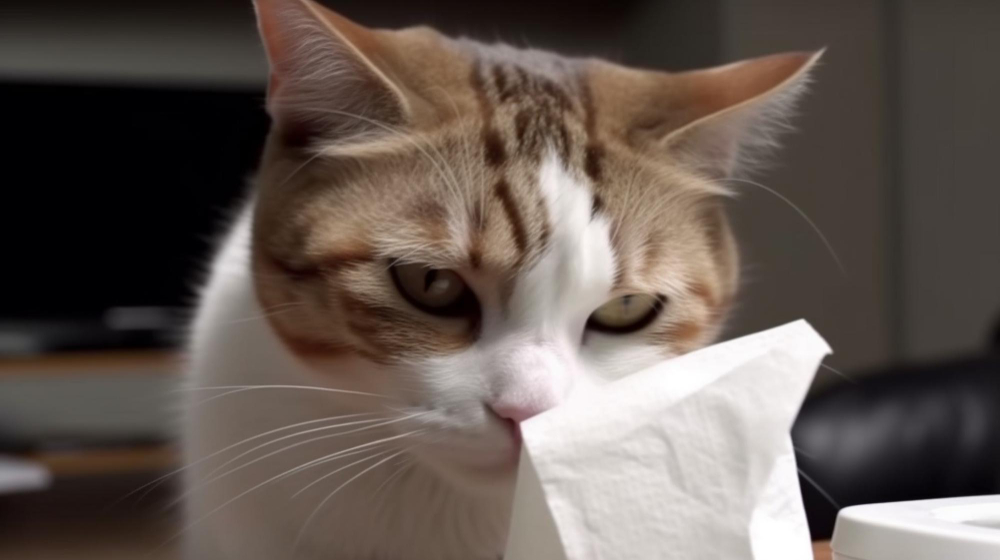
If your cat has allergies, they have some mild symptoms. But things can get worse if you don't take the necessary steps to manage it.
Even if you're giving your cat allergy medicine, making your home a more allergy-friendly place for your furry friend is always a good idea. You can help your cat feel better without overwhelming them with medications.
Here are some at-home allergy combating steps you can take with the allergy medicine for cats:
-
Flea and Tick Prevention
These tiny pests can make your cat very uncomfortable and can also trigger their allergies. These allergies usually occur from flea saliva when a flea bites your cat. Using preventive measures in your house year-round helps ensure your cat's well-being and prevents your cat's symptoms from getting worse, so your cat won't get flea allergy dermatitis.
-
Keep Your Home Clean
Regular cleaning is very important to get rid of common allergens like dust, mold, and mildew. These can trigger allergies in both cats and humans. Vacuuming once or twice a week, particularly in areas where your cat spends time, helps reduce the risk of your cat's allergies worsening.
-
Air Purifier
An air purifier is a great addition to your home, especially if your cat has allergies. It filters the air, removing particles like dust, pollen, and mold spores, which could otherwise contribute to your cat's discomfort.
-
Watch for Mold
Mold thrives in damp areas. Proper ventilation in your bathroom, using dehumidifiers, and fixing any leaks right away can help prevent mold growth.
If you spot mold, use bleach to clean it, but keep your cat away from the area until it's thoroughly cleaned.
-
Clean Bedding
Your cat's bedding can be a playground for dust mites, a common allergen. Regularly washing their bedding helps eliminate these tiny pests and provides your cat with a cleaner, more comfortable place to rest.
Don't forget about your own bedding, especially if your cat shares your bed.
-
Check Filters
Clean filters in your heating and cooling systems to ensure better air quality in your home. Replacing or cleaning them as needed can be very helpful in reducing allergens.
-
Clean Toys
Cat toys can gather germs, mold, and pollen over time. Regularly cleaning them and following any care instructions ensures a safer play environment for your pet.
Some toys are dishwasher-safe, while others can be machine-washed, so make sure you are taking care of the toys according to their care instructions.
-
Bath Time
Bathing your cat is a helpful way to reduce allergens that might be stuck to their fur.
This can also lessen the itching and discomfort that comes with allergies. Just make sure you use a cat-friendly shampoo and follow a gentle, stress-free bathing routine for your feline companion.
Final Words!
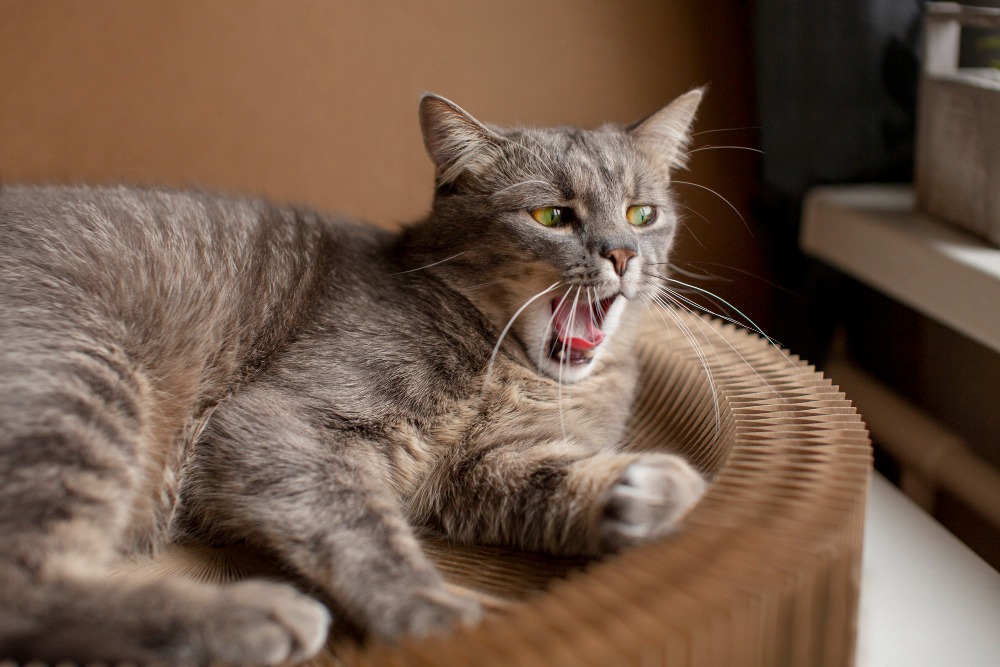
Dealing with cat allergies is something a lot of us, as pet owners, go through. Whether it's sneezing, itching, or skin issues, it's never easy to see our furry friends uncomfortable. But there's always a solution, and Rexipets just walked you through it!
Whether it's environmental allergies, food allergies, or flea allergies, there are ways you can make things easier for your cat.
From different medications to keeping a clean home to completely altering your furry friend's diet, there are ways to help our cats feel better.
However, one important thing to remember is to always consult with a vet. No matter how well we may know our cats, the vets know their stuff. They're like our partners in this journey, guiding us to make the right choices for our pets.
So, let's work with our trusted veterinarians to ensure our cats live a comfortable, itch-free life filled with love and mischievous little tricks.
FAQs
What is the best antihistamine for cats?
The most commonly used antihistamine for cats is diphenhydramine, commonly known as Benadryl. It's generally safe for most cats when given in the right amount, which is usually 1 mg of diphenhydramine per pound of their body weight. However, you should get your vet on board before giving it to your cat to treat their allergies.
Can I give my cat allergy medication meant for dogs?
Mostly pet owners make this mistake of giving medicines made for dogs as allergy medicine for cats, which is not right at all. Allergies in cats are very different. So, it's crucial to use cat-specific medications, as drugs intended for dogs can be harmful to cats. It can have adverse effects on your feline pal. Always check with your vet before introducing a new medication.
How does an elimination diet work?
Elimination diet is usually done to check a food allergy. An elimination diet includes eliminating foods from your cat's diet and observing if their symptoms are improving. This is done to find out which foods might make your cat feel itchy or unwell and remove them from their diet. This way, you can figure out what foods are causing the allergies and avoid them in the future, making your cat feel better.
This is an effective method, but it might take up to a couple of months to find out the exact troublemaker.


0 comments